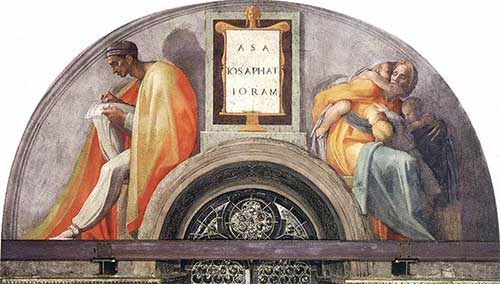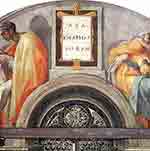
and Jesse the father of King David. And David was the father of Solomon by the wife of Uriah, and Solomon the father of Rehoboam, and Rehoboam the father of Abijah, and Abijah the father of Asaph, and Asaph the father of Jehoshaphat, and Jehoshaphat the father of Joram, and Joram the father of Uzziah (Matthew 1:6-8)
Ἰεσσαὶ δὲ ἐγέννησεν τὸν Δαυὶδ τὸν βασιλέα Δαυὶδ δὲ ἐγέννησεν τὸν Σολομῶνα ἐκ τῆς τοῦ Οὐρίου
Σολομὼν δὲ ἐγέννησεν τὸν Ῥοβοάμ Ῥοβοὰμ δὲ ἐγέννησεν τὸν Ἀβιά Ἀβιὰ δὲ ἐγέννησεν τὸν Ἀσάφ
Ἀσὰφ δὲ ἐγέννησεν τὸν Ἰωσαφάτ Ἰωσαφὰτ δὲ ἐγέννησεν τὸν Ἰωράμ Ἰωρὰμ δὲ ἐγέννησεν τὸν Ὀζίαν
This is the sixth post in a series – you can begin here:
Matthew in Slow Motion 1
Matthew in Slow Motion 2
Matthew in Slow Motion 3
Matthew in Slow Motion 4
Matthew in Slow Motion 5
As this year the Sunday Gospel readings’ focus is on St Matthew’s Gospel, I thought I’d start some of my personal study and Lectio Divina with that Gospel. [NB. I am using ‘Matthew’ as a convenient term for the author of the first Gospel in the order of the Christian canon].
We’ve already been going too fast!!!
For I failed to note the title added after David in verse 6. And we can do better than the translation “King David”. The Greek (Δαυὶδ τὸν βασιλέα) translates fine into English as “David the King”.
Adding “the king” sets David apart from all the men on the list so far. This giving a title also looks forward to Matthew 1:16 “Jesus …who is called the Messiah” (Ἰησοῦς ὁ λεγόμενος Χριστός).
And (have I got this right?) Matthew places a special emphasis on “king” – using it 22 times in his book. No other New Testament work uses “king” this often. The message of Jesus is the “Kingdom of God”.
Asaph – Sorry (again) to Bible-innerancy readers, it wasn’t “Asaph”. It was “Asa” (1 Chr 3:10; 1 Kings 15:9). Copyists realised Matthew’s mistake pretty early on and ‘corrected’ the text to “Asa”. People who read the KJV never even notice the issue:
And Solomon begat Roboam; and Roboam begat Abia; and Abia begat Asa;
Joram the father of Uzziah – there’s a little slippage here! It actually goes: Joram; Ahaziah; Joash; Amaziah; Uzziah (or Azariah). I think this is just another of Matthew’s mistakes (although he’s got to get his numbers correct – but that’s a spoiler for a future post). It looks as if Matthew is confusing “Ahaziah” and “Ussiah”. Ahaziah, Joash, and Amaziah aren’t that positive are they in 2 Kings 11-14 – but I would be arguing that would be reason for Matthew to include them, not to exclude them.
The list continues with no pattern of good and bad kings, continuing Matthew’s emphasis that bad can come from good and good can come from bad. In today’s list, we have evil Rehoboam is followed by evil Abijah. We skip the three wicked kings and come to good Asa (whom Matthew calls “Asaph”). Good Jehoshaphat is followed by evil Joram and good Uzziah.
To be continued…
If you appreciated this post, consider liking the liturgy facebook page, using the RSS feed, and/or signing up for a not-very-often email, …




Matthew’s use of ‘kingdom’ seems to have the others beat also. Only Luke even approaches it.